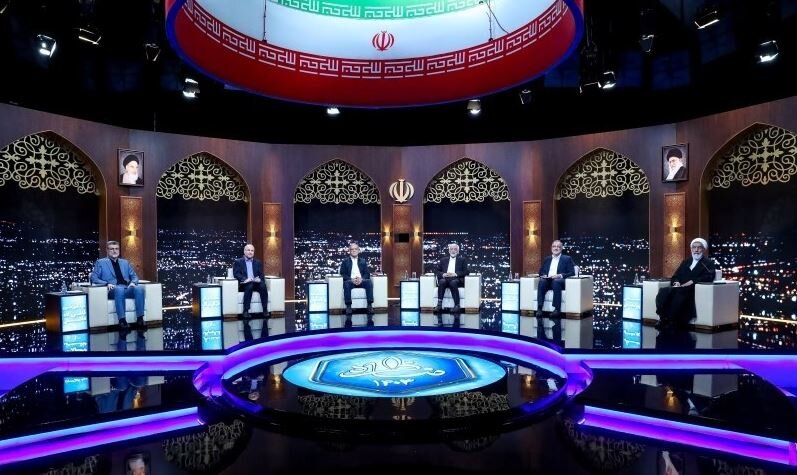Unpacking the first presidential debate

TEHRAN – Six presidential candidates participated in their first-ever televised debate on Monday, vying for the votes of viewers who eagerly sought a candidate aligned with their vision for Iran's future.
The debate was the first of five scheduled to take place in the span of nine days. Presidential hopefuls shared their policies and plans for Iran’s economy in their first direct face-off before the June 28th vote.
The debate was deemed underwhelming by some viewers, who believed candidates failed to spark voters’ interest partly due to the long duration of the televised debate. From the moment the six figures turned up at the IRIB headquarters to the time they finished delivering their points, a good six hours had passed.
Quarrels less pervasive than before, but still there
Televised debates for presidential candidates began airing in 2009. Since then, multiple politicians appearing on TV have been condemned for their lack of ethical conduct and their unfair attacks on opponents.
Despite a relatively calmer tone compared to previous years, Monday's debate still saw some candidates criticized for prioritizing attacks on their opponents over promoting their own agendas. One of these censured individuals was conservative candidate Alireza Zakani, who spent a significant time trying to undermine reformist Masoud Pezeshkian’s positions.
Among the candidates, Amir-Hossein Ghazizadeh Hashemi was praised for his collected and professional demeanor. The hopeful believed to have left the best impression on the viewers is Mostafa Pourmohammadi, a rather unfamiliar face for Iranian citizens.
Pourmohammadi urged authorities to believe in Iranian capabilities while they strive to learn from their past mistakes. His comments on the conduct of Iran’s banks, sanctions, and corruption were also received well by the audience.
The perceived front-runners of the elections, Pezsehkian, Saeed Jalili, and Mohammad Bagher Qalibaf, were criticized for repeating rudimentary facts and already discussed topics.
New polls reveal that while the three candidates have not gained significant ground, Pourmohammadi is emerging as a more prominent figure in the race for the presidency, drawing greater attention from voters.
Zarif makes a comeback after lying low for three years
Pezeshkian tried to bolster his campaign for support on Tuesday by taking former Iranian Foreign Minister Mohammad Javad Zarif as his advisor to a political roundtable on national TV.
Zarif became a household name in 2015 when Iran signed the Joint Comprehensive Plan of Action (JCPOA) with the 5+1 group of countries under his tenure as the top diplomat. He gained immense popularity for reaching a relative thaw with Western nations after years of tensions and terminating Iran’s sanctions.
However, his popularity was short-lived as former U.S. President Donald Trump withdrew from the pact in 2018 and re-imposed heavy sanctions against Iran under the “maximum pressure campaign.” European signatories to the deal also failed to uphold their commitments. Since the de facto collapse of the JCPOA, Zarif has been criticized for compromising on Iran’s nuclear achievements and inking an agreement with the West without reliable guarantees.
During his appearance on TV, Zarif defended the signing of the JCPOA, stating that Trump’s withdrawal from the pact does not mean the deal was innately erroneous.
“Trump also withdrew from the Paris Agreement on climate change mitigation and the INF deal with Russia. Does that mean that these were bad agreements?” he argued.
While the appointment of the former foreign minister as Pezeshkian's advisor is considered to be a good strategic political maneuver, its impact on the candidate's vote count remains uncertain.
By Mona Hojat Ansari
